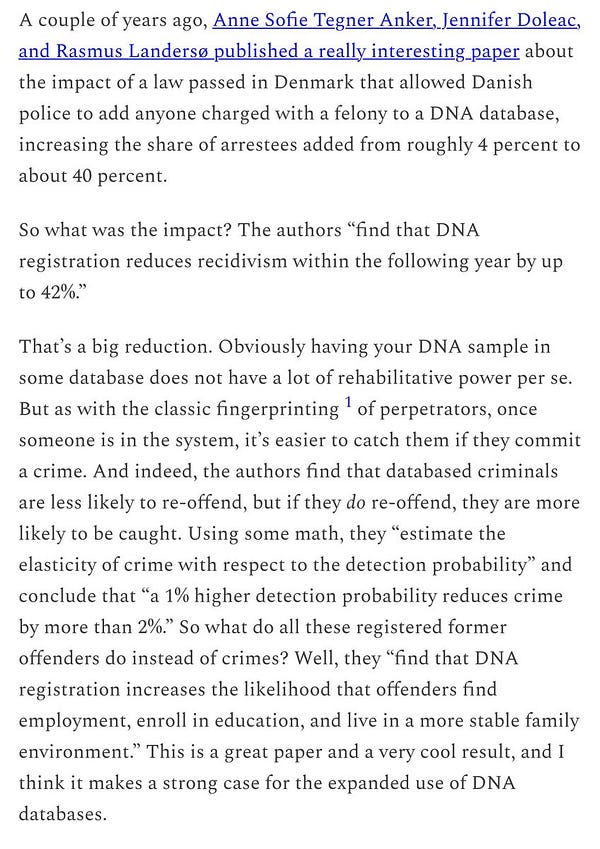Techify the Police: What a New Biden Crime Bill Might Look Like
Genetics, satellites, and facial recognition are what's in order

I’ve recently been reading the new book, The Long Alliance: The Imperfect Union of Joe Biden and Barack Obama by Gabriel Debenedetti. It’s very good.
I’ll have a longer write up about the book and why it made me like President Biden — and really dislike President Obama — at a later stage, but for now let me just note that Biden was seemingly quite worried about his authorship of The Violent Crime Control and Law Enforcement Act before he ran for office in 2020.
Naturally Republicans tried to attack Biden over his support of the 1994 crime bill but it didn’t quite work. Black Americans, many of whom are working class and victimized by black criminals, largely supported the crime law, surprising though that is to read now. Black Americans also supported Joe Biden and that’s why he’s president. Among the more interesting paragraphs in the book was this one:
“When Brendan Boyle, a young Philadelphia-area congressman, soon visited Biden in DC for what was supposed to be a thirty-minute drop-in, he pointed out that history since the 1970s showed that Democratic primaries tend to be won by the candidate who best appeals to working-class voters, both Black and white. The only time progressive intellectuals got their pick was in 2008, he continued, but that was because African American voters had also backed Obama. Biden, Boyle said, fit the winning mold and could win back Pennsylvania, while all his likely opponents were too much like failed candidates Gary Hart, Paul Tsongas, or Howard Dean.”
Boyle endorsed Biden the day Biden announced.
For what it’s worth my view is that the problem with the ‘94 crime bill was its over-reliance on incarceration and its under-reliance on technology to achieve the same ends. That’s not exactly the law’s fault. Many of the technology advances that we enjoy today didn’t exist in 1994. (I was six then and preoccupied with childhood at this photo will attest.)
I can certainly imagine a world where nonviolent criminals are severely limited from criming and where federal prisons are altogether unnecessary except for the most violent of offenses. I can even see a lot of Americans sign off on that — if they actually saw the criming go down. Having visited a few federal prisons in my day, I must say that they are quite ghastly, ghoulish places.
Deterrence, not punishment, is the name of the game. We must make it so that crime doesn’t pay, no, not a bit. Deterrence has been marginally effective since the time of Cesare Beccaria at best but that may be beginning to change.
For folks that would have a tendency toward smaller, nonviolent crimes, it’s probably going to have a root cause in something economic. Might better paying jobs lead to less crime?
Matt Yglesias — not at all the blogging bard of the U.S. Deep State ! — lays it out quite nicely in a post titled simply, “The best way to end mass incarceration is to catch more criminals.”


I agree with Yglesias but think there’s a bit more to it. Here are my recommendations. In the spirit of full disclosure I’m talking my own book here.
Facial recognition for all violent crimes. Allow NGOs and human rights groups access. Bellingcat should get an account. Clearview has its problems and its management needs changing or taming but facial recognition is here to stay. To be sure, Clearview needs to be cleaned up but like Musk’s Starlink, it, too, can be pressed into the service of the state, especially given its Emirati cap table. Hoan would need to go or be sidelined. When I cofounded Clearview I had long thought that Broken Windows wasn’t wrong — no, not exactly — but that it was incomplete. We don’t want a police state but we do want to make sure that a police officer’s precious time isn’t wasted.
Require genomic genealogy for all violent crime. No more corrupt state and government labs! Othram has provided the solution. So why are state labs still struggling at testing all the rape kits? This is a solved problem so fund solving it!
Sequence all federal inmates for crime and health considerations. We’d happily do that work at Traitwell. Start with those who want to be sequenced — and eventually get the rest. The serial nature of violent crime demands it. The obligation that the Bureau of Prisons has to pay for the health care of the incarcerated demands genetic sequencing anyway.
Mandate license plate readers in high crime areas. Flock Safety has been a success at catching car thieves though what it was doing with $380 million+ in venture capital, I couldn’t say. Still, let’s expand it. (Of course we can’t have Chisraeli front Andreessen Horowitz in the cap table!)
Allow civilian and law enforcement use of satellites. No more expensive helicopters or drones which don’t work (or are compromised by the Chinese!)
Require the Department of Commerce’s National Institute of Standards and Technology (NIST) assessment of all law enforcement technology. Grant automatic contracts if the technology works and passes security review. Have that be the new standard. No more Mark43s! (Why was Mark43 offered $177 million a now canceled contract in Australia anyway?) No more ShotSpotters stealing from the public treasury. No more missing Axon police footage! No more weird stuff with Evidence.com!
Make investors liable for bad performing law enforcement tech, especially if their investors are foreign. Make procurers personally liable for bad tech decisions if they fail to get the technology examined by the Commerce Department before selling it to unsuspecting police departments.
Get these recommendations done and done right and gun control will logically follow. Many of us own guns somewhat reluctantly. One of my very liberal friends told me that he needed to own guns in the pro-gun world though he personally hated them.
For what it’s worth I am against criminal justice reform. My friends have done compelling work showing that ending cash bail led to bedlam in America’s cities. One of my friends wrote a rather amazing report for the Harris County police outlining all those failures. Another friend notes:
I think it would be pretty natural to roll back reforms that have co-occurred with rising crime.
What seems like common sense to me is that if you want to eliminate the money bail system for the stated reasons (unfair to the poor, etc) then you need to pair it with harsher penalties for bond violations. The problem is that reformers aren't, in fact, just offering a specific critique of cash bail. They are against enforcement altogether.
Yes, I am against hug a thug policies. The desire isn’t to turn our societies into a police state but to make serial violent crime a thing of the past.
We can have enforcement and justice.




Excellent. They are happy to use tech for speeding violations, and raise revenue. Time to use it to keep criminals off the streets.